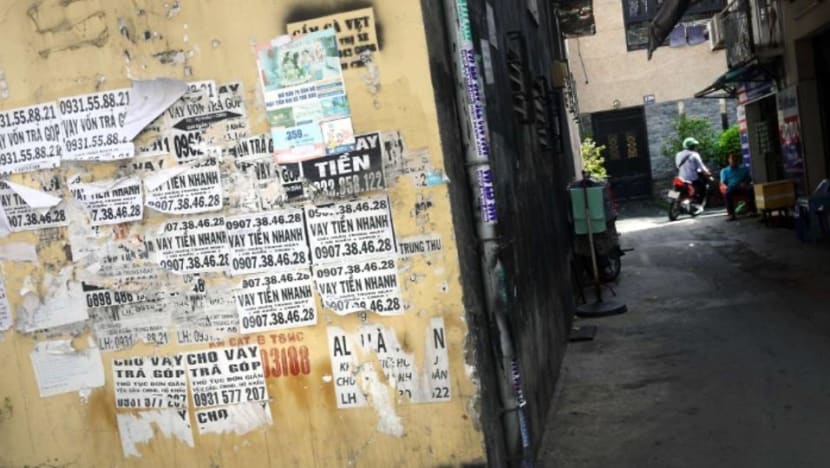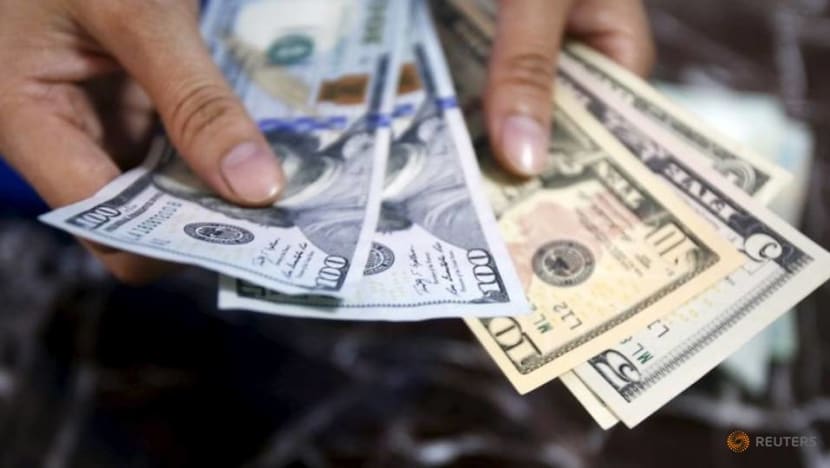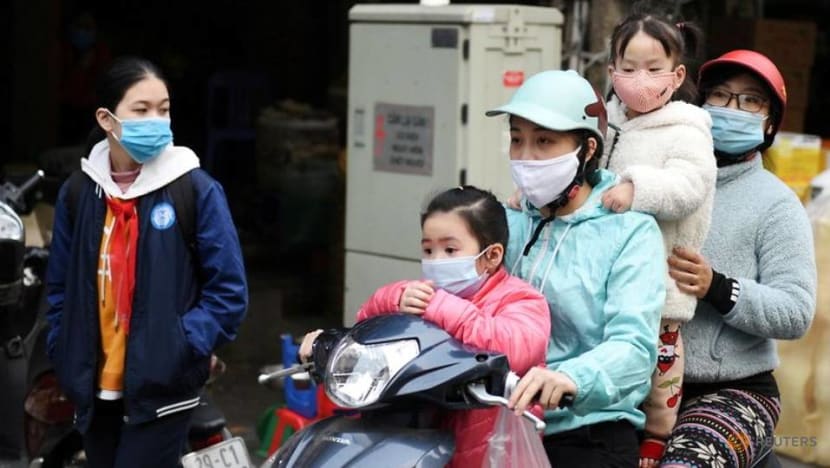Commentary: As bad debt climbs, rough collection tactics spell trouble in Vietnam
In Vietnam, recovery of late debts involves three things: Gentle reminders, perfidy and a dash of death threats to you and your family, say researchers.

Posters for black credit are glued on the walls of Ho Chi Minh City. The messages say “lend money quickly”, “borrow capital, pay on instalments”. (Photo: Nicolas Lainez)
SINGAPORE: Hiệp* is a 46-year-old courier and a father of two living in Hanoi, Vietnam.
The once busy streets of the city have left him destitute due to COVID-19 restrictions over the past year, all because he picked a bad time to open a restaurant.
Worse, to fund his small business, he took out a loan of US$1,520 with FE Credit, a major financial company, only to find himself at odds with vicious debt collectors in Vietnam.
His predicament began when he was short on payments for less than a week. At first, he got a phone call form FE Credit warning how he would become a “nationally wanted criminal” for “fraudulent crimes and appropriation of state property” if he did not pay his dues in full and on time.
Eventually, reminders about repayments began to involve his wife and brother-in-law who received calls more than 30 times a day from contracted debt collectors. Most were framed as urgent requests for repayments, while a handful not only veered on harassment but sometimes took the form of outright threats.
READ: Commentary: Thugs with strong-arm debt collection tactics? Vietnam’s misunderstood informal credit sector
These collectors also subsequently uploaded manipulated images of his wife, who acted as his referee and a de facto guarantor, on his social media, with captions implying she was giving sexual favours to help her husband pay his debt.
“Family is the most important thing”, Hiệp said to us. The incident was the last straw that broke the camel’s back and forced him to unwind his business to pay them off.
VICTIMS OF BAD DEBT
Unfortunately, Hiệp is not the only person falling victim to such money-lending woes. Since the COVID-19 outbreak, millions of Vietnamese workers have experienced unemployment, furloughs or falling incomes.
Job instability and fallen incomes have benefitted both legal and illegal lending. While financial companies like FE Credit have experienced a surging demand for cash loans, many borrowers have fallen into indebtedness.

Despite investing in artificial intelligence-based credit risk assessing tools, FE Credit has troubles securing repayments. Non-performing loans ticked up to 6.6 per cent in 2020 in tandem with most financial institutions reporting a similar rise across the board, which explains the growth in aggressive debt collection efforts to some extent.
FE Credit should have had strong foundations, being a branch of the credible Vietnam Prosperity Joint‑Stock Commercial Bank that leads the Vietnamese consumer finance market and having built up a base of 14 million low-income and unbanked aspiring borrowers since its founding in 2015.
Yet lending to millions of unknown customers carries inherent risk that the most sophisticated risk analysis tools are unable to tame. Consumer finance companies operate in an unfavourable environment where 70 per cent of the population has no bank account and credit history, according to the World Bank.
Vietnam news reports in 2020 carry FE Credit’s clarification that they take strict action against partners who flout the rules, including handing over cases that violate the law to the authorities.
There have been expressed public concerns online with hundreds of YouTube videos showing quarrels between mafia-like collectors and distressed borrowers, and Facebook groups hosting harassed and revengeful borrowers.
Members in groups like Exposing FE Credit/VPBank express frustration about abusive collection practices and share practical knowledge on how to manage loan repayments.
READ: Commentary: Resurgent pandemic sparks unemployment crisis among Malaysia’s most vulnerable workers
ROUGH TACTICS
Ngân*, a former employee from the FE Credit headquarters in Ho Chi Minh City, explained to us that clients must pay a fixed day every month, failing which a sizable penalty is imposed if no payment is made up by the fourth day.
After the first week, FE Credit floods the client and his referees – relatives, friends, employees – with reminders including dozens of text messages and calls a day.
If payments are still not made after the first month, borrowers would fall into a “bad debt” category. FE Credit debt collectors would be sent to the borrower’s home to investigate and pursue payment.
After two months, depending on the amount of debt, FE Credit will push ahead with legal proceedings or rely on third parties to recover arrears.
Here lies the crux of the debt collection. Consumer finance companies like FE Credit may either commission third parties to recover portfolios of bad debt for a margin of the profit or sell them at a low price altogether.

Ngân explained how FE is no longer responsible for the loan at this point and would have nothing to do with the employed recovery methods.
FE has refuted claims it allows the use of such measures to intimidate borrowers. Yet FE Credit’s stance is also that third-party collectors are legitimate companies that operate under a business registration certificate for debt collection, which until recently, was a legal arrangement when debt could be sold to third parties.
Never mind that those same laws also stipulate collectors must refrain from “infringing upon life health, dignity, honour, personal freedom, property rights and other civil rights” of debtors and related individuals.
Employed gangs sometimes use even more forceful recovery methods including charging penalties, sending a deluge of insults and threats, harassing relatives and publicly disclosing borrowers’ debt status.
Violent collection practices regularly make the headlines in Vietnam. FE Credit is only the eye of the storm.
READ: Commentary: Why helping the world’s poorer nations is in the interest of the richer ones
DEBT COLLECTION
Thankfully, there has been strong backlash calling for the regulation of debt collection practices in unsecured loans, with positive developments towards greater consumer protections.
Vietnam recently imposed regulatory limits on consumer personal loans to mitigate the exposure of financial institutions.
Apart from limits on personal-loan-to-total-consumer-loan ratios, the State Bank of Vietnam has imposed curbs that allow only financial companies to contact debtors no more than five times a day from 7am to 9pm. Debt collection activities must now exclude involving entities with no debt repayment obligations to the financial institution.
The recent Investment Law passed by the National Assembly of Vietnam has also banned debt collection services since January. Financial companies can no longer commission or sell bad debt to third parties by law.

Still, collection practices in Vietnam could be more strictly regulated and enforced when anecdotal accounts suggest consumer finance companies continue to enlist such debt collectors through alternative arrangements like debt trading agreements.
Regulators should also encourage Vietnamese consumer finance companies to look at more helpful practices that can aid consumers in paying them off. Data gleaned from consumer banking patterns can help firms customise a flexible and automated recovery strategy based on online payment options and self-service portals. To some extent, FE Credit is already experimenting these collection technologies.
The prohibition of debt collection remains a conundrum for many. Consumer finance cannot thrive without a collection industry.
We can only hope that such practices outlined by Hiệp, the distressed borrower and Ngân, the former debt collector will recede and stay in the past, where they belong.
*Pseudonyms have been used in this commentary.
Nicolas Lainez is a Visiting Fellow at ISEAS–Yusof Ishak Institute.
Bui Thi Thu Doai lives in Hanoi. She studies Development and Economics at the University of London, London School of Economics.
Trinh Phan Khanh is a recent political science graduate specialising in international relations from Leiden University.
Le To Linh is studying International Studies at Hollins University.





















